Apparently according to her, muslims don't lie.
https://twitter.com/M_kasheer/status/13 ... 8775683073
Funnily enough that might actually be true. ropers feast on their own first before venturing out in the wildsuryag wrote:The only thing she can accuse him further is of child molestation, ack thoo on these leftists
someone on tv was just now saying that the average landholding of a punjab farmer is 3.1 hectares which is 3 times the average national holding and the subsidy per family is about 1.2 lakhs per annum on primary inputs like power, fertilizer, water etc which no other state gives/can afford to give.nandakumar wrote:One question that I would dearly like to have answered is what is the aggregate land holding of farmers squatting on the road at the Singhu border and who is tending to the wheat fields, while they are away?
TIMES NOW@TimesNow·1h
#BREAKING | Canadian PM @JustinTrudeau raises issue of farmers' protest in India; says that Canada will always be there to defend right to hold peaceful protest.
'We believe in importance of dialogue, we've reached out via multiple means directly to Indian authorities', he says.
TIMES NOW@TimesNow·5h
#Breaking | US Govt makes submission in California court that Tahawwur Rana, the key accused of 26/11 Mumbai attack, be cleared for extradition to India.
And this is how they deal with their own peaceful protesters.chetak wrote:can't believe that this opportunistic piece of political crap has poked his white nose into India's internal affairs again.
what next.... bhangra once again in garishly colorful costumes
These people do as much dirty dirty as the next guy but are always the first to lecture others.Notes from a strategy session for a militarized raid on ancestral lands of the Wet’suwet’en nation show that commanders of Canada’s national police force, the Royal Canadian Mounted Police (RCMP), argued that “lethal overwatch is req’d” – a term for deploying an officer who is prepared to use lethal force.
The RCMP commanders also instructed officers to “use as much violence toward the gate as you want” ahead of the operation to remove a roadblock which had been erected by Wet’suwet’en people to control access to their territories and stop construction of the proposed 670km (416-mile) Coastal GasLink pipeline (CGL).
Thanks. The frustrating thing for me as retired journalist is to see reporters, the current lot I mean, instead of probing away to find the truth have reduced themselves to mere human dictaphones and faithfully reproduce what is being told to them. Take the Arnab's interview with the Punjab Chief Minister. I watched it. Well not all of it. From what I saw it was clear that it was all theatre. Fundamental questions such as why should it be assumed that the FCI procurement would be stopped once private trade enters Punjab? Or what is the basis for saying that FCI would be wound up? There was no attempt to establish the fact that the agitation was not driven by genuine anxieties about livelihood or the exact opposite. In short, the truth.chetak wrote:someone on tv was just now saying that the average landholding of a punjab farmer is 3.1 hectares which is 3 times the average national holding and the subsidy per family is about 1.2 lakhs per annum on primary inputs like power, fertilizer, water etc which no other state gives/can afford to give.nandakumar wrote:One question that I would dearly like to have answered is what is the aggregate land holding of farmers squatting on the road at the Singhu border and who is tending to the wheat fields, while they are away?
Even punjab has gone into dire financial straits just by pandering to these guys and now amarinder slyly wants the center to pick up the tab for what is essentially the state bribing its vote banks under the guise of "subsidies".
these are certainly not marginal farmers, as is being made out.
Rajat Kumar Gupta was convicted in June 2012 on insider trading charges of four criminal felony counts of conspiracy and securities fraud in the Galleon scandal. He was sentenced in October 2012 to two years in prison, an additional year on supervised release and ordered to pay $5 million in fines.
NDTV’s Prannoy Roy and wife Radhika caught for insider trading by SEBI. Rs.16.97 crores fine imposed and banned for two years from stock exchanges https://pgurus.com/ndtvs-prannoy-roy-an ... exchanges/ via@PGurus1

via @muglikar_Dear @narendramodi ji
How come 80% of wheat in Punjab is picked up by FCI at MSP whereas only 3% of UP farmers get it.
Punjab farmers apparently believe that middlemen run their homes.
Let's equally distribute FCI quota across all states and be fair to all.
Punjab has options.
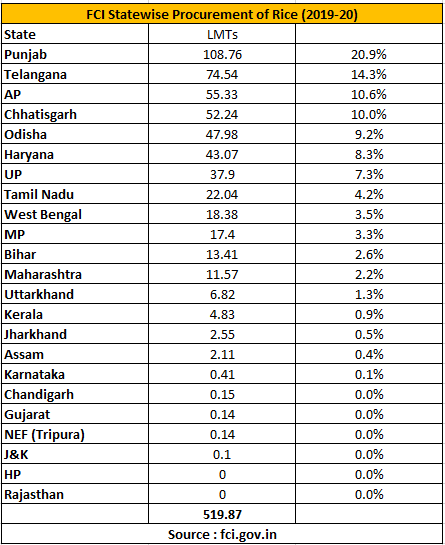
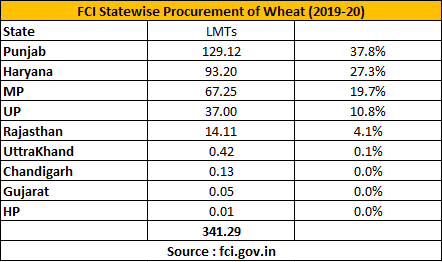
This is crossing the red lines in diplomacy, india should retaliate in appropriate way to Southern Americachetak wrote:can't believe that this opportunistic piece of political crap has poked his white nose into India's internal affairs again.
what next.... bhangra once again in garishly colorful costumesTIMES NOW@TimesNow·1h
#BREAKING | Canadian PM @JustinTrudeau raises issue of farmers' protest in India; says that Canada will always be there to defend right to hold peaceful protest.'We believe in importance of dialogue, we've reached out via multiple means directly to Indian authorities', he says.
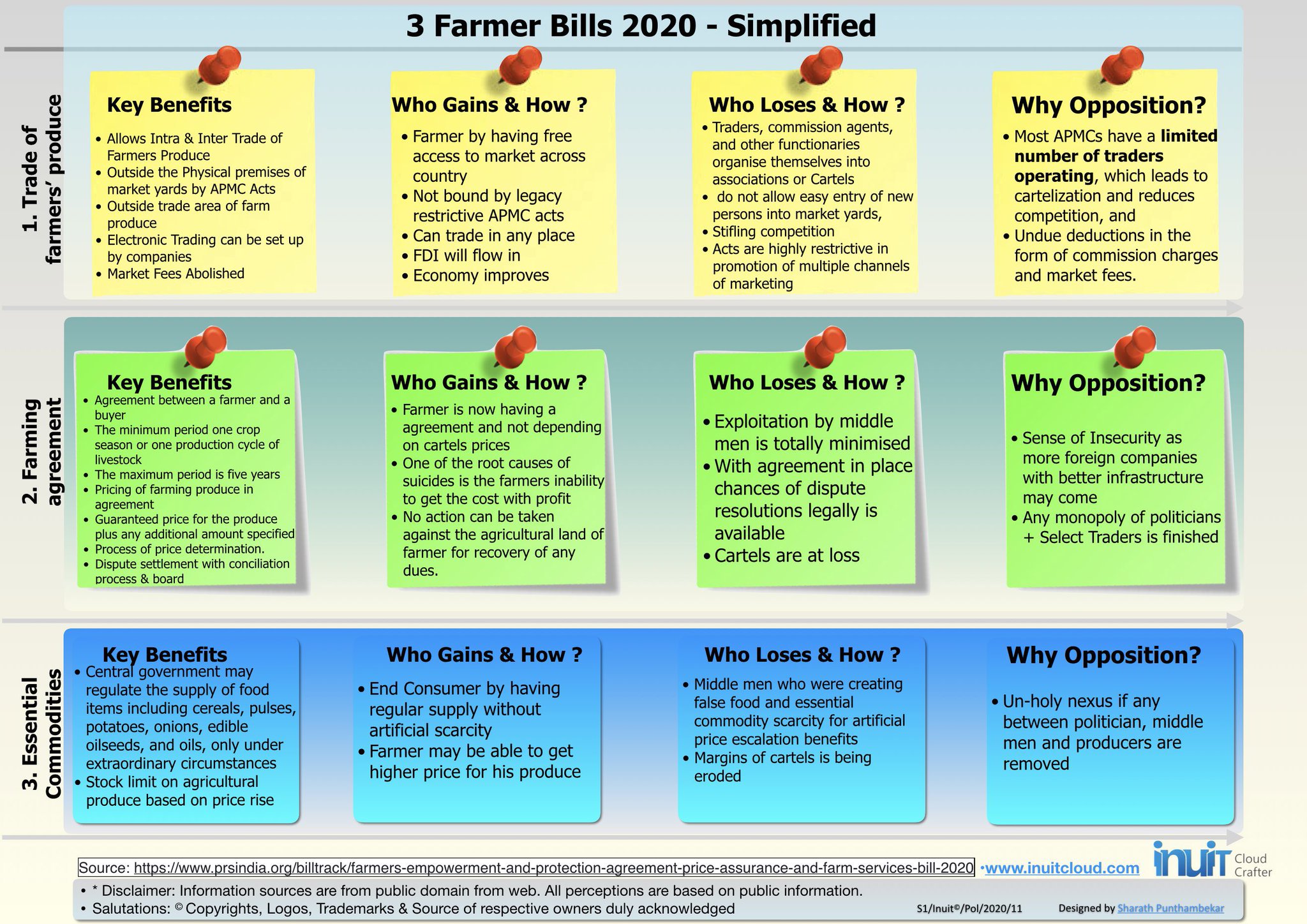
Did you know?
During revolt of 1857, the British got the Sultan of Turkey (Caliph) to issue an order in favor of the British.
As a result, Indian Muslims began to look upon the British as friends and protectors.
Not my words, but from a PhD thesis at Aligarh Muslim University.
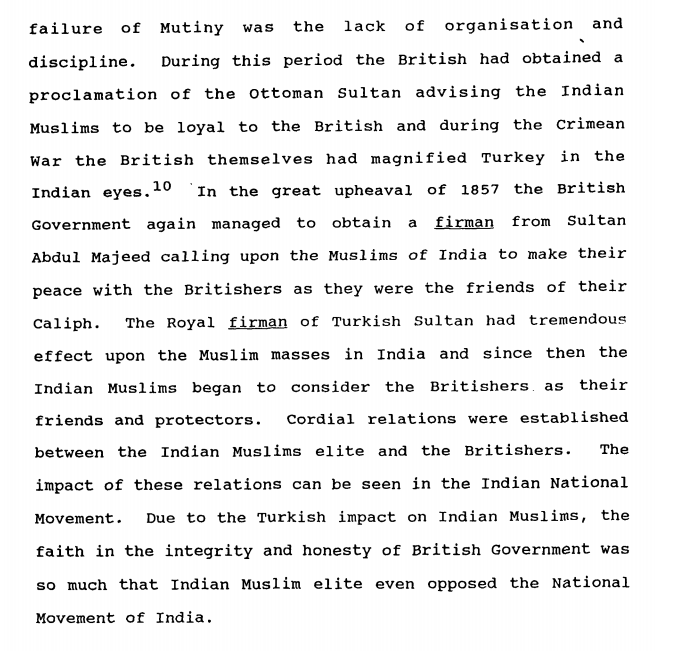
An unnatural reason is that a high artificial price basis was eliminated due to the farm bill, resulting in lower incomes . This is likely a more permanent problem unless farmers respond by diversifying into crops with higher profits.Suraj wrote:Is it an economic one, or an economic patronage one ? There's a significant difference between the two.ManSingh wrote:I would still re-iterate that the current issue is an economic one and not a political one ( as yet ). Khap panchayats and farm leaders from Rajasthan and Western U.P. have been supportive and are actively participating in current protests.
An economic one is one that due to a combination of potentially localized factors, results in Punjab's farm productivity and economic activity to be negatively effected. Economic reasons can further be natural or unnatural. For example, a natural reason is that the farm bill weakened APMCs, resulting in delays in offtake or procurement that caused losses to farmers, This could be a temporary issue. An unnatural reason is that a high artificial price basis was eliminated due to the farm bill, resulting in lower incomes . This is likely a more permanent problem unless farmers respond by diversifying into crops with higher profits.
An issue of economic patronage of course, is that the wealthy landed political class with a history of APMC driven wealth and graft, are fomenting 'farm protests' as a political exercise. As chetak posted earlier, any sudden well organized protest is a sure sign of foreign money and influence at work.
It's possible that reality is not one but a combination of all of these. But even so, are the members of this protest primarily about any one motive ?
Most of the farmers dont get MSP, very few get it. In that also a part of harvest is bought as MSP which is not enough. Forget about MSP, crop insurances after the floods are not delivered to the farmers. Everything gets eaten up by the system.ManSingh wrote:An unnatural reason is that a high artificial price basis was eliminated due to the farm bill, resulting in lower incomes . This is likely a more permanent problem unless farmers respond by diversifying into crops with higher profits.Suraj wrote: Is it an economic one, or an economic patronage one ? There's a significant difference between the two.
An economic one is one that due to a combination of potentially localized factors, results in Punjab's farm productivity and economic activity to be negatively effected. Economic reasons can further be natural or unnatural. For example, a natural reason is that the farm bill weakened APMCs, resulting in delays in offtake or procurement that caused losses to farmers, This could be a temporary issue. An unnatural reason is that a high artificial price basis was eliminated due to the farm bill, resulting in lower incomes . This is likely a more permanent problem unless farmers respond by diversifying into crops with higher profits.
An issue of economic patronage of course, is that the wealthy landed political class with a history of APMC driven wealth and graft, are fomenting 'farm protests' as a political exercise. As chetak posted earlier, any sudden well organized protest is a sure sign of foreign money and influence at work.
It's possible that reality is not one but a combination of all of these. But even so, are the members of this protest primarily about any one motive ?
This is exactly what it is. The prices of certain crops were guaranteed due to MSP mechanism. Now with entry of private players it is feared that the MSP mechanism will gradually be dismantled ( not immediately ). Crop diversification does not work with the current infrastructure. Lack of cold storage, high prices and lack of a distribution chain or even a framework to do so. India has a long way to go before this becomes a reality.
Ambar wrote:Government has clarified repeatedly there is no change to the current MSP mechanism, MSP cannot be codified, it cannot be made into a law but it will continue to be supported within administrative framework. Secondly, this bill is a great opportunity for farmers to form co-ops of their own to bargain within private buyers, the price they sell to private parties will be the price the farmers decide. Apparently another concern the farmers of Punjab have is that with the farm bill, the government may taper its purchases for PDS program. Again, government has not said anything about changes to PDS program, and even if there is a reduction, the farmers can sell it to other parties at a price dictated by the farmers . Today, the farmers who grow produce outside of the 20 odd commodities covered by MSP sell based on the price set by the wholesale markets, how is it fair that only one section of the farmers who produce commercial crops need assurance that everything they produce will be purchased at MSP where as majority of other farmers end up selling at market decided prices and sometimes throw away their produce angered by low prices ? Congresses pandering for votes for 70 years has created an upside down economy where without the government's crutches no one wants to take a step forward.
Most of these so called protesting farmers are from Sangrur belt in Punjab which a relatively high communist dominanted area anywhere in North India. That's one reason why AAP does well in this region in Punjab. Most of their MLAs & MPs are from this belt. Modi can offer them gold biscuits instead of MSPs these people will not move. Their motive is to protest, not to find a solution. That is the nucleas & electrons like Khaliatanis, JNU, Bhim, AAP Delhi have joined around it.chetak wrote:someone on tv was just now saying that the average landholding of a punjab farmer is 3.1 hectares which is 3 times the average national holding and the subsidy per family is about 1.2 lakhs per annum on primary inputs like power, fertilizer, water etc which no other state gives/can afford to give.nandakumar wrote:One question that I would dearly like to have answered is what is the aggregate land holding of farmers squatting on the road at the Singhu border and who is tending to the wheat fields, while they are away?
Even punjab has gone into dire financial straits just by pandering to these guys and now amarinder slyly wants the center to pick up the tab for what is essentially the state bribing its vote banks under the guise of "subsidies".
these are certainly not marginal farmers, as is being made out.
Sonugn wrote:Canadian Joker has issued a statement in favor of the protestors. This is a blatant interference. Let's not forget this is going to be a seige on the national capital via 5 entry points.
Amb. should be summoned & a demarche issued.
ANI@ANI·6h
We've seen some ill-informed comments by Canadian leaders relating to farmers in India. These are unwarranted especially when pertaining to internal affairs of a democratic country. It's also best that diplomatic conversations aren't misrepresented for political purposes:MEA Spox
It's the same in the US also. I visited a Gurdwara in Illinois about 10 years ago and it will full Khalistani with Satwant/Kehar portraits and a drawing of Indira Gandhi hanging from a tree. An eye opener. Like you say it's the kids of those who came in 1980s who are brainwashed by their parents and who don't realize that India has moved on.vimal wrote:Canada has one of the highest Khalistani population all 2nd/3rd gen Sikhs there with no real roots or sense of history just regurgitating whatever urban legends they've been told. Their primary source of information is Sikhwiki an ISI funded venture.
forget the patronizing and inneundo filled article saar, even the writer's name is pretentious.KLNMurthy wrote:Parsa Venkateshwar Rao Jr | Will our farmers force arrogant govt to yield?
Read the article closely, putting aside your feelings about the author's bias.
My takeaway is crystal clear: the issue is not the economic merits of the new farm laws at all, it is purely political, and that too very narrowly political: cutting Modi down to size.
How will the MSP mechanism gradually get dismantled by the opening up of the marketplace to private players? I am a total layman, and my naive economic reasoning is as follows:ManSingh wrote: ...
This is exactly what it is. The prices of certain crops were guaranteed due to MSP mechanism. Now with entry of private players it is feared that the MSP mechanism will gradually be dismantled ( not immediately ). Crop diversification does not work with the current infrastructure. Lack of cold storage, high prices and lack of a distribution chain or even a framework to do so. India has a long way to go before this becomes a reality.
so, come sowing season, will these guys will be heading back home, or maybe even earlier due to the migrant labor shortageM_Joshi wrote:Most of these so called protesting farmers are from Sangrur belt in Punjab which a relatively high communist dominanted area anywhere in North India. That's one reason why AAP does well in this region in Punjab. Most of their MLAs & MPs are from this belt. Modi can offer them gold biscuits instead of MSPs these people will not move. Their motive is to protest, not to find a solution. That is the nucleas & electrons like Khaliatanis, JNU, Bhim, AAP Delhi have joined around it.chetak wrote:
someone on tv was just now saying that the average landholding of a punjab farmer is 3.1 hectares which is 3 times the average national holding and the subsidy per family is about 1.2 lakhs per annum on primary inputs like power, fertilizer, water etc which no other state gives/can afford to give.
Even punjab has gone into dire financial straits just by pandering to these guys and now amarinder slyly wants the center to pick up the tab for what is essentially the state bribing its vote banks under the guise of "subsidies".
these are certainly not marginal farmers, as is being made out.
a large percentage of the grain farmers anyway do not get the MSP advantage so they are forced to sell at the very same mandis but at prices well below the MSP, grains which the agents buy at distress sale prices and sell at MSP through their contacts in the APMC mandis and FCI officesKLNMurthy wrote:What I see is an emotive and irrational fear & loathing of "corporates" and their "profit motive", and maybe a kind of envy factor or status anxiety on the part of the wealthier kulak farmer that their more marginal brethren will now be bridging the economic and status gap that now exists. IOW, it is better for the kulaks to sacrifice the possibility of making more money for themselves (which has low marginal utility for them anyway), if the reward is that their poorer counterparts will not have the opportunity to use the open market (driven by said "corporates" and their "profit motive") to better themselves and start strutting around like they are equal to the kulaks.
If that's so, then what use are the mandis in the first place?chetak wrote:a large percentage of the grain farmers anyway do not get the MSP advantage so they are forced to sell at the very same mandis but at prices well below the MSP, grains which the agents buy at distress sale prices and sell at MSP through their contacts in the APMC mandis and FCI officesKLNMurthy wrote:What I see is an emotive and irrational fear & loathing of "corporates" and their "profit motive", and maybe a kind of envy factor or status anxiety on the part of the wealthier kulak farmer that their more marginal brethren will now be bridging the economic and status gap that now exists. IOW, it is better for the kulaks to sacrifice the possibility of making more money for themselves (which has low marginal utility for them anyway), if the reward is that their poorer counterparts will not have the opportunity to use the open market (driven by said "corporates" and their "profit motive") to better themselves and start strutting around like they are equal to the kulaks.
...
A pertinent question and one which will become even more pertinent over the coming years. Whatever their original intent, they have morphed into a major node in a socio-political system in many parts of the country rife with rent-seeking.If that's so, then what use are the mandis in the first place?
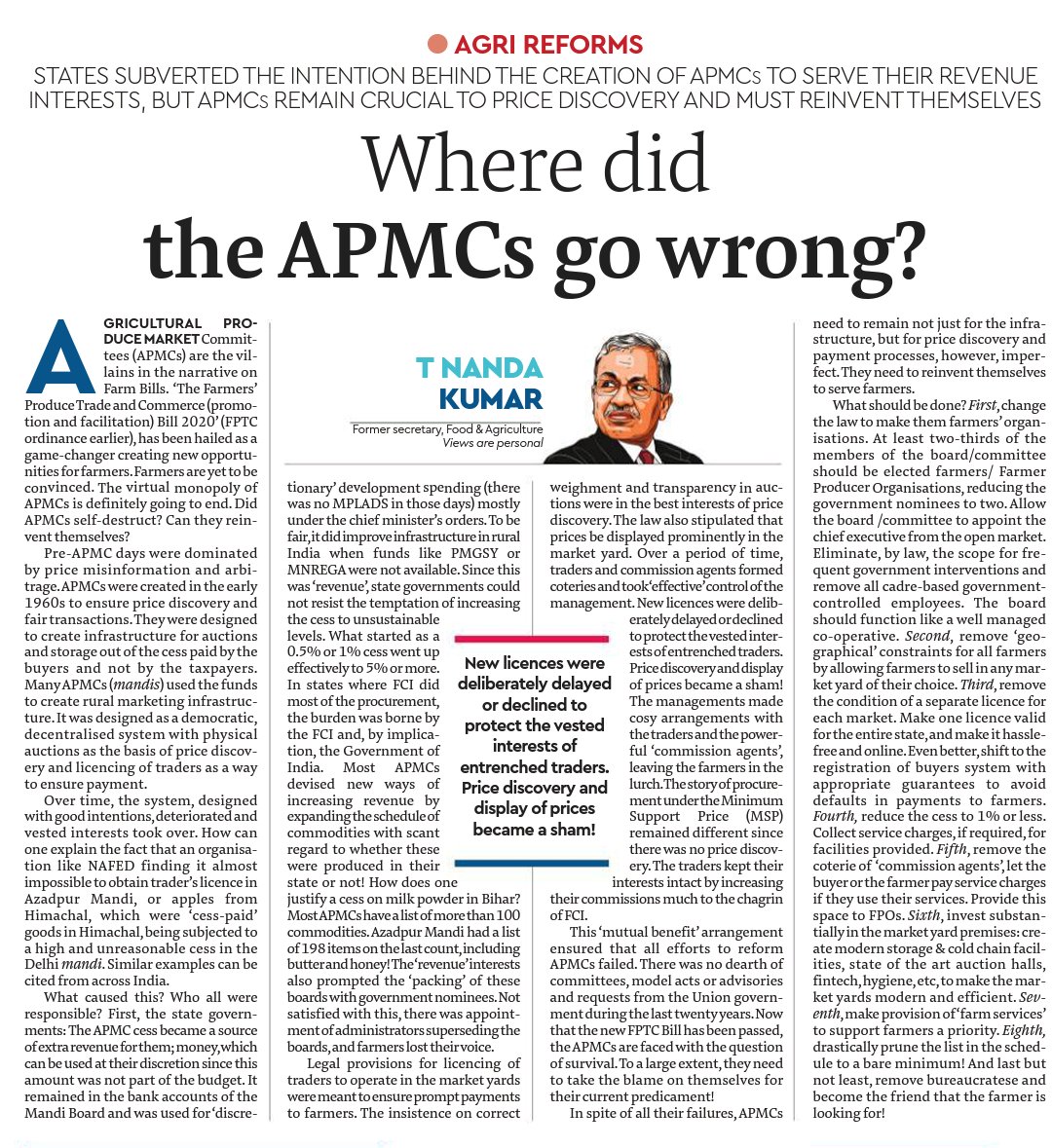
The unrest is being closely watched by many people in B.C. who come from the area and still own property there.
Nothing wrong here. Land inheritance is not affected by citizenship. NRI's can not buy agricultural land but if they inherited it, it is perfectly legal.vera_k wrote:Canadian press article with pictures of protests in British Columbia.
B.C. politicians, local farmers worried about unrest in India's Punjab and Haryana states
Given a couple of quotes like this one below, I wonder if Punjab farmland or farming rights are owned by Canadians. That might explain why Canadians are getting worked up over the prospects of the farm legislation.
The unrest is being closely watched by many people in B.C. who come from the area and still own property there.
how do you think that the rest of the maal gets/got sold.KLNMurthy wrote:If that's so, then what use are the mandis in the first place?chetak wrote:
a large percentage of the grain farmers anyway do not get the MSP advantage so they are forced to sell at the very same mandis but at prices well below the MSP, grains which the agents buy at distress sale prices and sell at MSP through their contacts in the APMC mandis and FCI offices
...
punjab has not spent this mandi fees money for the declared purpose for some years now.ManSingh wrote:MSP ( minus mandi fees ) is guaranteed for a crop covered by MSP mechanism. There are no variances in payouts or middlemen taking a cut here. There is no variation in prices either. It almost always increases every year.
Middlemen make money on advancing loans against future produce. Farmers need money to pay for inputs. When formal channels of banking are exhausted or a farmer does not qualify for a loan, the farmer asks middlemen/Arhtiyas. They charge an exorbitant interest rate for this. Also the arhtiyas have some influence on whose crop gets picked first but this is not a deal breaker.
Mandi fees sustains the infrastructure necessary for APMC mandi's ( where MSP priced crops are purchased). This infra is the responsibility of the state government who also collects the mandi fees for this purpose alone. With any drop in crops procured under APMC, the mandi fees collection will also drop. This also means the infra required for such procurement will/can not be maintained as present and may gradually wither away.
Hope it helps.